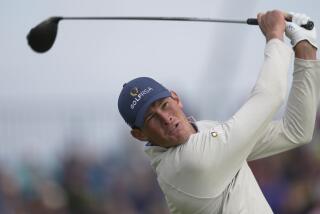Winning British Open isn’t as ‘easy’ as Ernie Els makes it look
LYTHAM ST. ANNES, England -- Like most everything else about the masterful golfer Ernie Els, including his nickname, another British Open title fits him like a pair of slippers.
In the end, after an incredible turn of events and a shocking finish on a comfortable and overcast Sunday afternoon here, the Big Easy made it somehow feel right in all regards.
He began the day as just another guy a few notches down the leaderboard. He was in position, at best, to score a nice paycheck. He had a commendable 54-hole start of 67-70-68, five under par, but leader Adam Scott was hitting greens and making putts like a programmed robot. Scott was seven shots ahead of Els early in the round, and any projected drama surely did not include the South African.
He was, after all, 42 years old, and only 58 days younger than last year’s surprise senior citizen winner, Darren Clarke, was at the time. Certainly, that wasn’t going to happen again.
This was the British Open, always a grueling test, no matter where they play it. Youth may be wasted on the young, but it plays well in the humps, bumps and gorse of British links layouts.
Els still trailed Scott by six shots after he made a bogey on No. 9. “I was angry with myself about that,” Els said.
But anger usually didn’t mean much on this minefield of pot bunkers known as Royal Lytham & St. Annes golf course. Nor was there much recent history to indicate that Els was a dangerous chaser. He had won two U.S. Opens, in 1994 and ‘97, and his last major title was the 2002 British at Muirfield. He hadn’t even made the cuts at St. Andrews in 2010 and Royal St. George’s last year. Nor had he played in this year’s Masters, because he hadn’t qualified.
Few crystal balls saw the elder Els coming home with three birdies, including a 20-footer on the 18th that got the ground shaking all the way back to the 17th tee, where Scott, just turned 32 last week, was coming apart.
“I didn’t have to look at the scoreboard to realize the situation,” Scott said.
He had bogeyed Nos. 15 and 16 and was still eight under par, a shot ahead of Els, when he stood over his approach on the 17th. He said he and caddie Steve Williams had talked, on the 17th tee, of making “just six more good swings.” Scott’s iron to the 17th wasn’t one of those, the ball bouncing into tall rough behind the green, and when he bogeyed again, he had slipped into a tie with Els at seven under.
The number went up on the big scoreboard at the 18th hole, and reaction from the packed stands, and hundreds more standing nearby behind barriers, was a buzzing crescendo. Yes, it could happen. The startling, the heretofore unthought-of, could actually take place. If Scott didn’t par the 18th hole, a straight-on, relatively easy (except for the ever-present bunkers) par four, the beloved Els would be the one standing with the beloved Claret Jug.
Then Scott hit his drive into one of the 206 sandy pits placed neatly around this course and another wave of amazement swept No. 18. Now, he would have to hit it out sideways and get his third shot close enough to make a par putt just to get into a playoff with Els.
Nobody saw this coming.
Every seat in the massive horseshoe of bleachers was filled. Every spot behind the barriers well back to mid-fairway was claimed, with spectators four and five deep behind. In the VIP seats, perhaps the best in golf for such an occasion, club members who had watched all day from little dining alcoves inside the clubhouse and perhaps 30 yards from the green — bangers and mash and bogeys? — pulled chairs to the windows. They were close enough to have as good a read on Scott’s 10-foot putt to tie as he did.
And so, at 6:19 p.m. local time, the Aussie with the still-unfulfilled great promise pulled his putter back and the world of golf shook again. His putt slipped past and Els, standing on the putting green behind the clubhouse and awaiting a possible playoff, knew he had won by the sound.
Now, the combination of joy for Els and horror for Scott — the win mind-boggling and the collapse gut-wrenching — became a situation in need of some handling. Enter the Big Easy, the man so named because of how he swings a golf club and paces his way through life.
He found Scott in the players’ area and Scott related what happened.
“He said he felt for me and to not beat myself up,” Scott said. “He said I’m a great player and I can go on to win majors, which is nice.”
It was a gesture not mandatory, but helpful. It was Payne Stewart, taking Phil Mickelson’s head in his hands after the 1999 U.S. Open.
Then Els took the healing to those still not sure how to feel, the crowd around the 18th. They cheered him at the awards ceremony and he courted them with humor: “Are you being nice, or do you really believe I’m the winner?”
Others would have celebrated the victory and forgotten the vanquished.
Not Els, a man who has played on pro tours for 22 years, who takes joy in being the father of a 9-year-old son with autism, Ben, and has a foundation that champions that battle, and whose lasting image here was as a regular guy sprawled in a big chair in the lobby of the nearby Clifton Arms Hotel on Saturday morning, watching the BBC and chatting with other guests.
About Scott’s great collapse, he said, “I’ve been there before. I hope he doesn’t take it as hard as I did.”
Champions come along every day. Compassionate ones do not. On Sunday at the British Open, Ernie Els was there for everybody.
More to Read
Go beyond the scoreboard
Get the latest on L.A.'s teams in the daily Sports Report newsletter.
You may occasionally receive promotional content from the Los Angeles Times.











